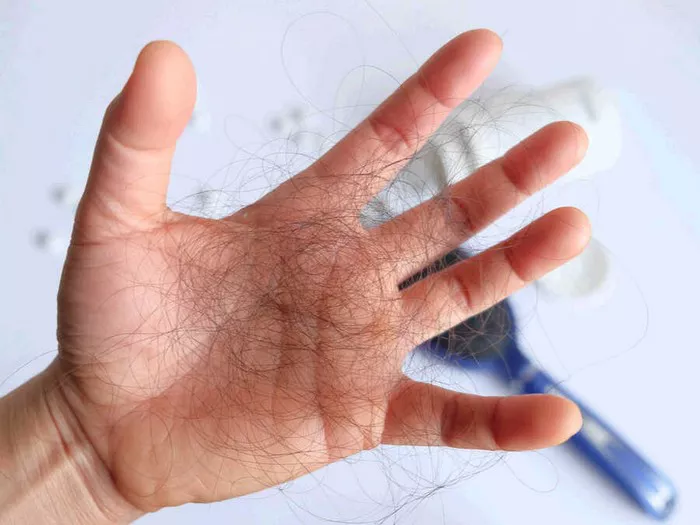Dengue fever, a mosquito-borne viral infection, can have various side effects, including severe hair loss. While the fever itself doesn’t directly cause hair fall, the stress on the body, nutritional deficiencies, and immune response can significantly impact hair health. This article explores effective strategies to stop hair fall after dengue recovery, ensuring a comprehensive approach to regaining your hair’s health and vitality.
1. Nutritional Support for Hair Recovery
Balanced Diet
A balanced diet rich in vitamins and minerals is crucial for hair regrowth. Include foods high in:
- Protein: Eggs, lean meats, beans, and nuts.
- Iron: Spinach, red meat, lentils, and fortified cereals.
- Vitamin A: Carrots, sweet potatoes, and dark leafy greens.
- Vitamin C: Citrus fruits, strawberries, and bell peppers.
- Vitamin E: Almonds, sunflower seeds, and avocados.
- Omega-3 Fatty Acids: Fatty fish like salmon, flaxseeds, and walnuts.
Hydration
Proper hydration is essential for overall health, including hair health. Aim for at least 8 glasses of water a day to keep your scalp hydrated and support hair growth.
Supplements
Consider taking supplements if you find it difficult to get all necessary nutrients from food alone. Biotin, iron, and multivitamins specifically formulated for hair health can be beneficial. Always consult with a healthcare professional before starting any supplements.
2. Gentle Hair Care Practices
Avoid Harsh Treatments
Limit the use of heat styling tools, chemical treatments, and tight hairstyles that can stress the hair and scalp. Opt for air drying your hair and using gentle styling methods.
Use Mild Hair Products
Choose shampoos and conditioners free from sulfates and parabens. Look for products that contain natural ingredients like aloe vera, coconut oil, and argan oil, which can nourish the scalp and hair.
Regular Scalp Massages
Massaging your scalp can improve blood circulation, which helps in delivering nutrients to the hair follicles. Use your fingertips to gently massage your scalp in circular motions for about 5-10 minutes daily.
3. Medical Interventions
Consult a Dermatologist
If hair loss persists, it’s important to consult a dermatologist. They can assess your condition and recommend treatments such as:
- Topical Treatments: Minoxidil can be applied to the scalp to stimulate hair growth.
- Oral Medications: Medications like finasteride can be prescribed for severe cases.
- Platelet-Rich Plasma (PRP) Therapy: This involves injecting your own platelet-rich plasma into the scalp to encourage hair growth.
Addressing Underlying Health Issues
Post-dengue, the body can experience a weakened immune system and other underlying health issues that might contribute to hair loss. Regular medical check-ups can help identify and treat any underlying conditions.
4. Stress Management Techniques
Mindfulness and Relaxation
Stress is a major factor in hair loss. Incorporate mindfulness techniques such as meditation, yoga, and deep breathing exercises into your daily routine to manage stress levels.
Adequate Sleep
Ensure you get 7-8 hours of quality sleep each night. Sleep is vital for the body’s repair and recovery processes, including hair growth.
See Also: How Much Hair Loss Is Normal After Pregnancy?
Physical Activity
Engage in regular physical activity like walking, swimming, or cycling. Exercise not only reduces stress but also improves blood circulation, promoting a healthy scalp and hair.
5. Home Remedies and Natural Treatments
Aloe Vera
Aloe vera is known for its soothing and healing properties. Apply fresh aloe vera gel directly to your scalp, leave it for about 30 minutes, and then wash it off with a mild shampoo.
Coconut Oil
Coconut oil has been used for centuries to nourish hair. Warm some coconut oil and massage it into your scalp and hair. Leave it overnight and wash it off the next morning. This can help in strengthening the hair and reducing hair fall.
Onion Juice
Onion juice is rich in sulfur, which helps in hair regrowth. Blend an onion to extract its juice and apply it to your scalp. Leave it for 15-20 minutes before washing it off with a mild shampoo.
Green Tea Rinse
Green tea is packed with antioxidants that can promote hair growth. Brew some green tea, let it cool, and use it as a final rinse after shampooing your hair.
6. Psychological Support
Counseling and Support Groups
Dealing with hair loss can be emotionally challenging. Seek counseling or join support groups to connect with others who are experiencing similar issues. Sharing your feelings and experiences can provide emotional relief and practical advice.
Positive Self-Image
Focus on building a positive self-image. Hair loss can affect self-esteem, but it’s important to remember that it’s a temporary phase. Engage in activities that make you feel good about yourself and boost your confidence.
Conclusion
Stopping hair fall after dengue involves a multifaceted approach that includes proper nutrition, gentle hair care practices, medical interventions, stress management, home remedies, and psychological support. By addressing the root causes and taking a holistic approach to hair health, you can significantly improve your chances of recovering from hair loss and restoring your hair’s natural vitality. Always consult healthcare professionals for personalized advice and treatment plans tailored to your specific needs.


